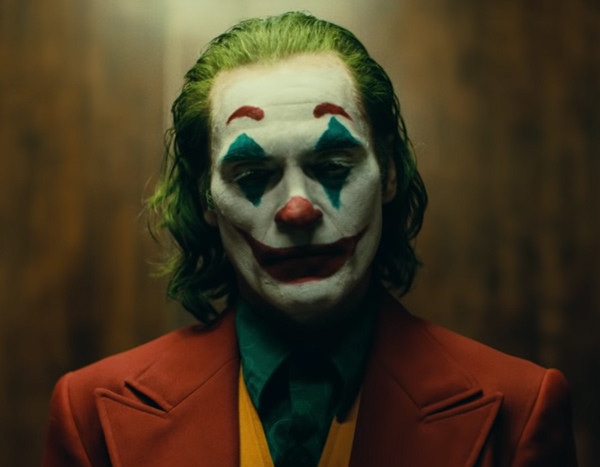
Why so serious?
That’s the question that’s likely been on the lips of every Warner Bros. and DC exec, not to mention star Joaquin Phoenix and director Todd Phillips, as they’ve prepared for the release of Joker, their gritty, grounded 1970s-set origin story for the iconic Batman comics villain. And that’s because before the film had even begun playing in theaters across the country, it seemed as though everyone already had an opinion on the film, and not all of them kind.
Since the first reviews out of the 76th Venice International Film Festival in August saw critics rather split on whether or not Phillips’ had the sort of sensitivity required to approach a story that took the birth of Batman’s most enduring adversary and placed it in a ultra-realistic world that seemed to deserve the sort of terror he enacts upon it while the director and his star received an eight-minute standing ovation at its screening, after which it took home the Golden Lion, the festival’s top prize, there’s been a wild divide over whether the film represents an abdication of responsibility on the part of its creator in light of, you know, all the madness going on in our real world or its simply victim to overreaction from a bunch of well-intentioned but overly squeamish hand-wringing critics.
After critics taking the film in during its North American debut at the Toronto International Film Festival in early September, a new round of reviews wondered whether or not Phoenix’s Arthur Fleck, a mentally ill part-time clown with dreams of becoming a stand-up comedian who is spurred towards violence after suffering a string of indignities from a cruelly indifferent world, could potentially inspire acts of domestic terrorism. And when Phoenix, a notoriously prickly presence when performing press duties, was asked by U.K.’s The Telegraph whether his character might wind up becoming a de facto mascot for the incel community (“involuntary celebate”), known to hide out in the ickiest recesses of the web, just brimming over with disdain for the world around them, he was not pleased.
“Why? Why, would you …? No, no,” he reportedly stammered before storming out of the interview in late September.
As we approached the October 4 release date, things didn’t get much calmer. On September 23, five family members and friends of the 12 people killed in the 2012 movie theater massacre in Aurora, Colorado carried out by James E. Holmes during a midnight screening of Christopher Nolan‘s The Dark Knight Rises, wrote a letter to Warner Bros. chief executive Ann Sarnoff to remind her that a “tragic event, perpetrated by a socially isolated individual who felt ‘wronged’ by society has changed the course of our lives,” adding, “When we learned that Warner Bros. was releasing a movie called Joker that presented the character as a protagonist with a sympathetic origin story, it gave us pause.” (In a since-debunked report, Holmes was alleged to have told police he “was the Joker.”)
The very same day, the U.S. Army Base at Fort Sill, Oklahoma sent a memo to commanding officers warning of a “credible potential mass shooting to occur at an unknown movie theater” screening Joker. Operating off intelligence posted by the sheriff’s office in Travis County, Texas, working in conjunction with local FBI operatives, the bulletin didn’t specify where the attack was supposed to occur, only that it was based on “disturbing and very specific chatter on the dark web.”
Within hours, Cinemark and Warner Bros. announced that Joker would not screen at the Century Aurora theater, former the Century 16, where Holmes’ rampage occurred, or the Century XD and the network released a response to the letter they’d received a day earlier. “Gun violence in our society is a critical issue, and we extend our deepest sympathy to all victims and families impacted by these tragedies,” it read. “At the same time, Warner Bros. believes that one of the functions of storytelling is to provoke difficult conversations around difficult issues. Make no mistake: Neither the fictional character Joker, nor the film, is an endorsement of real-world violence of any kind. It is not the intention of the film, the filmmakers, or the studio to hold this character up as a hero.”
As theater chains across the country began announcing plans to beef up security at screenings of Joker while reminding moviegoers of their strict no tolerance policies for masks, toy guns or anything that might make other guests uncomfortable, the studio began changing plans for its L.A. and NYC premieres, canceling all broadcast and print interviews at either, turning the green carpets at both into nothing more than photo ops for Phillips, Phoenix and co-stars Zazie Beetz, Marc Maron, and Robert De Niro, among others. Inside the L.A. premiere on Sept. 28, rather than introducing the cast and producers, Phillips quipped, “If you like the movie, tell a friend. We haven’t gotten enough press.”
A statement released by the studio regarding the decisions made about the premiere events simply read, “A lot has been said about Joker and we just feel it’s time for people to see the film.”
And the thing is, a lot of them did. Despite all the hot takes on what sort of power art has over unstable individuals, the film grossed $234 million in its first weekend, setting a new opening record for the month of October, while earning a B+ CinemaScore from audiences who actually sat it. While it seems as though Joker got the last laugh for now, with the film, and Phoenix’s performance in particular, generating serious award season chatter, don’t expect this debate to die down anytime soon.

